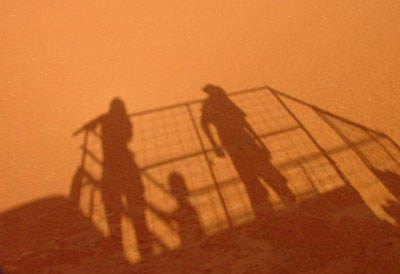
A crippling drought, described as the “worst in living memory”, continues to affect large swathes of Australia. CHRISTOPHER GILBERT takes a look at how Christian workers are involved in bringing relief to farmers in the states of New South Wales and Queensland…
During the western New South Wales drought of 1993, Melissa and Pastor Bill Close decided to visit farmers in that region. Towing a load of basic supplies they opened the gate to a far western property. Kilometres later they found the homestead.
Unwashed children stood lethargic in the yard while sounds of distress rang from the house. The Closes approached the door, cautious of a domestic dispute but instead they found a distraught woman in the immediate aftermath of her husband’s suicide. They helped her deal with the tragedy and ensured care for her kids.

The effects of the drought are obvious in parts of New South Wales. PICTURE: Courtesy of David and Gae McDonald (PIM)
At the next property they visited, the Closes found an older farming couple grieving the suicide of their teenage son. Experiencing years of farm-crippling dry, the boy had despaired that, with the end of the family farm, he had no future. From that the Closes realised what church agencies had also discovered: that in drought times, provisions, stockfeed, and debt relief were an immediate need, but the greater need was attending to farmers’ isolation.
Many bush pastors, chaplains, and agency heads agree: farming families need regular visits, listening ears, and reliable pastoral care. Where this occurs, they say farming families more readily face up to the bitterness of hard decisions, and unlikely self-described “heathen farmers” recognise the source of the help – behind the visitors – is in God.
“The drought now affecting much of Australia is named by some 60-year-olds as the worst in living memory.”
– Andrew Letcher, CEO of Presbyterian Inland Mission.
Care Outreach began as the Closes found ways to support farming families in southern Queensland and New South Wales as far south as Orange. Twenty-five years later, volunteers throughout this region have expanded their regular visits to 2,100 properties. While this is an independent Christian response, the denominational churches of Australia have been making a similar response for more than a century.
“The drought now affecting much of Australia is named by some 60-year-olds as the worst in living memory,” says Andrew Letcher, CEO of Presbyterian Inland Mission.
State departments of agriculture in Queensland and New South Wales validate that label and report that for April, 2019, the rainfall deficit has lasted as long as 12 years in many regions. It began just a few good years after the breaking of the previous worst-ever “Millennial Drought” in 2007.
In New South Wales, more than half of the state is in such a drought, and another quarter of the state is in “intense drought”. An additional fifth of the state is termed “drought affected”, meaning drought can be found everywhere except for in half a per cent of the state’s land area, in the south-east near the Snowy Mountains.
“I’m seeing kangaroos dying, heat exhausted and starved in the paddocks in such numbers that roo shooters have abandoned their work and gone to the mines,” says Colin Morrow, a PIM Patrol Team member. Meanwhile, David and Gae McDonald, Patrol Team members who operate in the state’s north-west, report whole paddocks of mature trees dying.
In Queensland, the southern 58 per cent of the state is in farm-destroying drought. And for another 30 per cent of the state in the north, where many farmers had already lost or sold off most of their stock through years of dry, record floods came in late January due to the rare collision of a monsoon and tropical low pressure system. It meant the past decade ended in a double whammy, meaning many have now lost their entire herds, homes and livelihoods.

The Uniting Church’s Frontier Service is part of the continuation of the Australian Inland Mission. PICTURE: Courtesy of Frontier Services
It’s easy to forget that the Presbyterian Inland Mission and the Uniting Church’s Frontier Services are continuations of the Australian Inland Mission, an early 20th century Presbyterian initiative whose first superintendent was Reverend John Flynn. Both agencies still work at providing what Flynn envisioned as “a mantle of care” over inland Australia.
“In a time where those living in metro Australia are even more connected than they have ever been, people in remote Australia are feeling the sense of social isolation even more. The need for face-to-face support is imperative.”
– says Jannine Jackson, the national director of Frontier Services.
The Anglican Bush Church Aid, The Salvation Army and Baptist churches around Australia are also channels for roving chaplaincy, volunteers and funding to assist remote farmers and station owners.
“In a time where those living in metro Australia are even more connected than they have ever been, people in remote Australia are feeling the sense of social isolation even more,” says Jannine Jackson, the national director of Frontier Services. “The need for face-to-face support is imperative.”
Alison Morrow is a PIM Patrol Team member who works alongside her husband Colin. They visit farm families in the south-west of New South Wales as well as further south into western Victoria.
“Now I’m encountering real depression,” she says. “People are feeling despair. A single man who can’t sell his property because it’s become so worthless; an older couple who bulldozed their orchards because they saw no future for themselves or their son. More elderly are simply walking off the farm.”
Colin calls her work a “ministry of tears”.
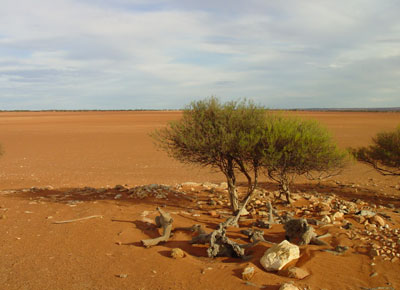
The drought in New South Wales. PICTURE: Courtesy of David and Gae McDonald (PIM)
Chris Voss, of the Bruderhof community’s “Danthonia” property near Inverell, says even though the property’s main income comes through a major signwriting business, they’ve had to sell off grazing stock to preserve their regenerated pastures. Voss also says a nearby farmer went out to shoot his starving cattle recently and turned the gun on himself.
“Government can’t make it rain, and, heartbreakingly, we cannot save every farmer,” acknowledged David Littleproud, Federal Minister for Agriculture and Water Resources, recently.
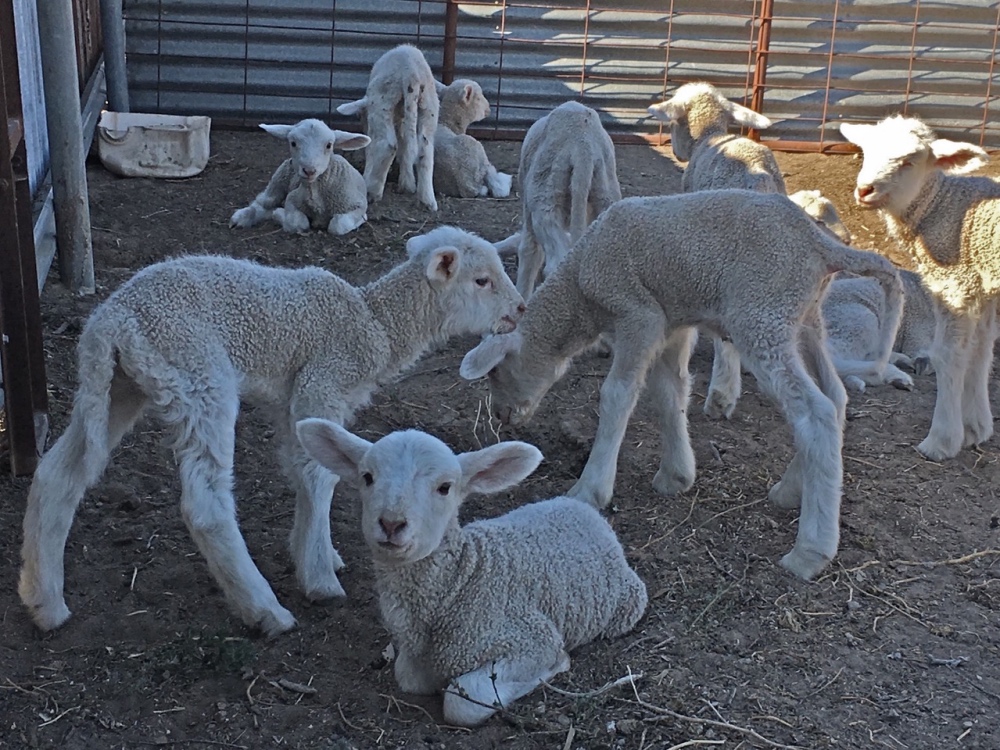
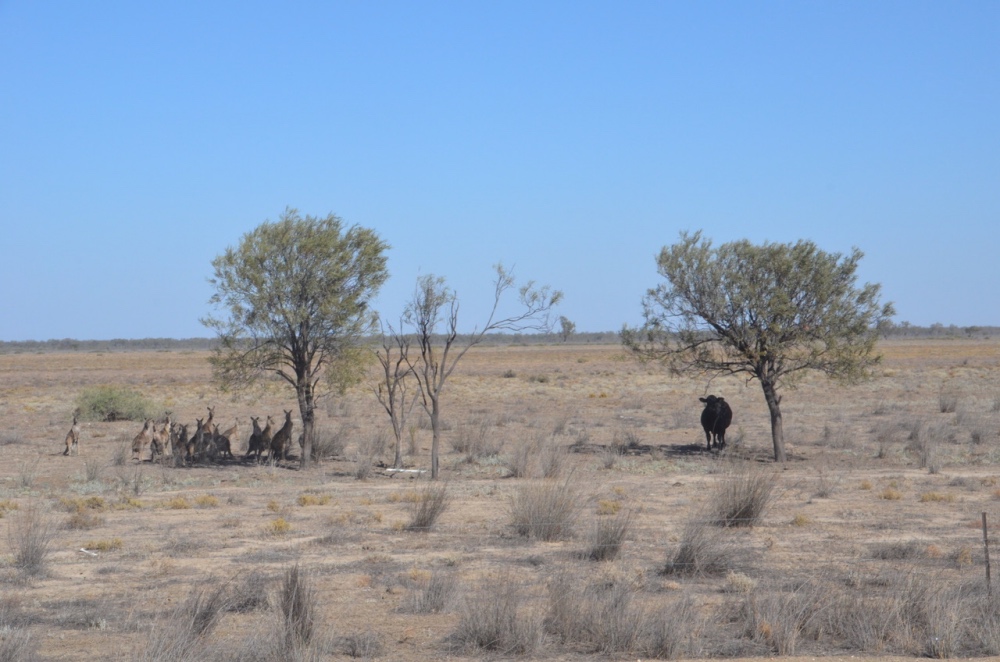
Top – Orphaned lambs; Below – Livestock and wild animals seeking shade. PICTURES: Courtesy of David and Gae McDonald (PIM)
“We cannot make decisions for them about whether they should buy feed in the hope that it will rain, or when to sell off stock. But we can and do provide free expert advice through Rural Financial Counsellors, and I urge farmers to use it.”
But this recent response expects the most isolated farmers to travel to regional centres in order to gain access, whereas Christian agency workers travel to them and have done so for many years. As advocates for the most isolated farmers, bush pastors and chaplains also say that the various relief convoys of stockfeed with their tightly drawn distribution boundaries are also missing some of the most needy.
When people care enough to visit isolated properties regularly, in plenty and drought, farmers often respond positively.
“My regional ministers were saying to me it would be around Easter time that would be incredibly hard for a number of areas, because that’s sowing season,” says Rev Dr Steve Bartlett, director of ministries for the Baptist Churches of NSW and ACT. “[They have to decide]: start to sow, or not worth sowing.”
The Baptist’s strategy has been to distribute appeal funds to the rural churches who apply for it on behalf of farmers they’ve come to know in their region. The aid to needy families comes in the form of vouchers so they will spend it in the towns where so many businesses are also affected by the drought’s economic hit. That means in some cases groceries get bought, or animal feed, or diesel, or some debts repaid, but it also means farm machinery gets serviced and repaired that would otherwise be driven to ruin.
Bartlett says an appeal, mainly through Sydney’s Baptist churches, raised $250,000 late last year, which is just now being utilised in the regions to alleviate some of the family suffering.
“There is the sense that this is going to be a long haul. It’s got a while to run yet, even when the drought breaks,” Bartlett says.
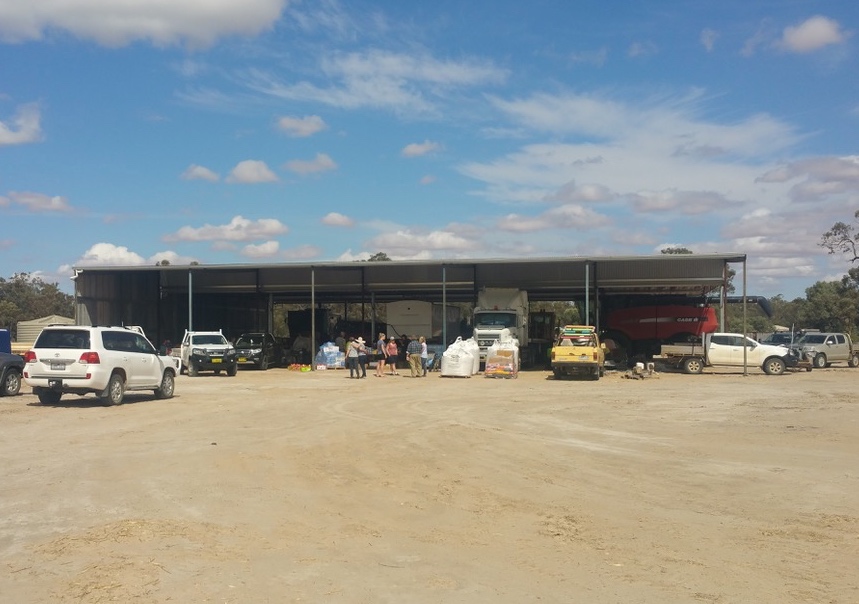
Farmers picking up supplies at a relief distribution day in Deniliquin, New South Wales. PICTURE: Courtesy of Colin Morrow (PIM).
For PIM teams, the agency Jericho Road, a care arm of the Presbyterian Churches in New South Wales, provides similar financial support and strategy to their visitation ministries.
Jericho Road has, for example, enabled David and Gae McDonald in north-west New South Wales to assist property owners with some debt relief, groceries, the purchase of feed for stock, or even powdered milk for large numbers of orphan lambs. They say volunteers from the cities who go out to provide hands-on help on properties, feeding animals, or helping dispose of carcasses, stay in hotels in order to further assist the local economies.
Elizabeth McClean, CEO of Jericho Road, also points to grassroots collaborations such as that involving Presbyterians in Campbelltown, Sydney, who have been able to form a partnership with the Presbyterians of the Wee Waa church, providing people and funds to assist needy farmers in that region.
“I’m excited for an answer to five years of prayer about the mental health of people in these drought affected regions,” says McClean. “We now have a free counselling service in Wee Waa once a fortnight by a professional counsellor who travels out from the coast”. Office space for the counsellor is provided by a couple from the same Wee Waa church.
Care Outreach, an independent ministry with a multi-denominational board of ministers, runs its own fund-raising to support provisions of brand-name products of essential food and personal care items to dignify the recipients. Regular bush chaplains and pastors of all these Christian agencies say many needy farmers will come when aid’s being distributed but then stand back from accepting the help because someone “more needy” might require it. They say it’s troubling when that self-reliance means self blame for the immanent loss of a generational family farm, and could drive the farmer to desperate measures.
Colin Morrow from PIM, for example, relates how a farmer at a Sunraysia Relief distribution day refused help – “No, no, no. I’m alright. Others will need it worse than me”. So Morrow just started loading the ute.
“In the end he accepted the help,“ Morrow says. “He eventually admitted he really needed it.”






